Self-compassion is essential for overcoming negative self-talk and building resilience. It involves treating oneself kindly during tough times, which fosters emotional strength. This article explores mindfulness techniques for awareness, self-kindness practices for positive dialogue, and the importance of recognizing shared human experiences. Understanding cultural influences on self-compassion can also enhance emotional resilience and personal growth.
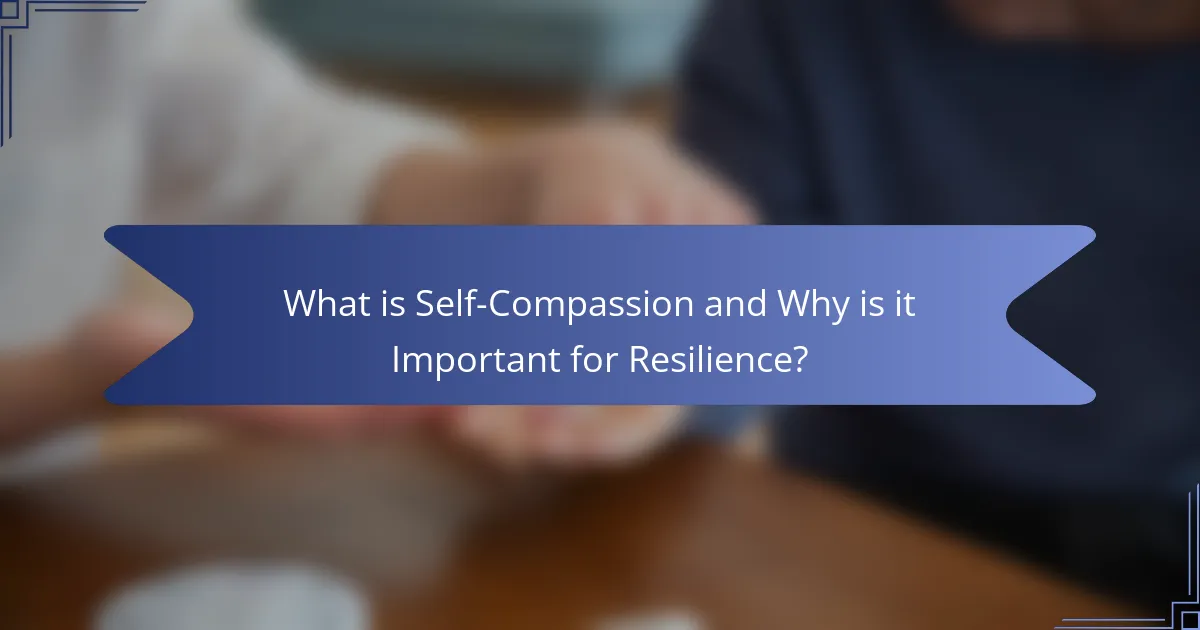
What is Self-Compassion and Why is it Important for Resilience?
Self-compassion involves treating oneself with kindness during difficult times, which is crucial for resilience. It fosters emotional strength, allowing individuals to recover from setbacks more effectively. Practicing self-compassion can reduce negative self-talk, leading to improved mental well-being. Research shows that self-compassionate individuals are more likely to engage in adaptive coping strategies, enhancing their ability to navigate challenges. By recognizing shared human experiences, self-compassion promotes a sense of connection and reduces feelings of isolation, further supporting resilience.
How Does Self-Compassion Combat Negative Self-Talk?
Self-compassion effectively reduces negative self-talk by fostering a supportive inner dialogue. This practice encourages individuals to treat themselves with kindness during difficult moments, countering harsh self-criticism. Research shows that self-compassion leads to greater emotional resilience, allowing individuals to navigate challenges without succumbing to negativity. By embracing self-compassion, people can cultivate a healthier mindset, ultimately diminishing the impact of negative self-talk on their well-being.
What are the Core Components of Self-Compassion?
Self-compassion comprises three core components: self-kindness, common humanity, and mindfulness. Self-kindness involves treating oneself with care during difficult times. Common humanity recognizes that suffering is a shared experience, fostering connection. Mindfulness allows for balanced awareness of emotions, preventing over-identification with negative thoughts. Together, these components cultivate resilience against negative self-talk.
How Does Self-Kindness Contribute to Emotional Healing?
Self-kindness significantly aids emotional healing by fostering a supportive inner dialogue. It encourages individuals to treat themselves with the same compassion they would offer a friend. This practice reduces negative self-talk, which often exacerbates emotional distress.
Research shows that self-compassion correlates with lower levels of anxiety and depression. When individuals embrace self-kindness, they cultivate resilience, enabling them to bounce back from setbacks more effectively. This unique attribute of self-compassion enhances emotional regulation and promotes a healthier mindset.
Incorporating self-kindness into daily routines can be achieved through mindful practices, such as journaling or meditation. These strategies reinforce positive self-affirmations, which contribute to long-term emotional well-being. The ability to be gentle with oneself is a rare quality that can transform one’s approach to challenges, fostering a more nurturing inner environment.
What Role Does Common Humanity Play in Resilience?
Common humanity enhances resilience by fostering connection and understanding among individuals. Recognizing shared experiences reduces feelings of isolation during challenges. This perspective allows individuals to practice self-compassion, counteracting negative self-talk effectively. Embracing common humanity leads to emotional growth and strengthens coping mechanisms. By acknowledging that suffering is a universal experience, individuals can cultivate a supportive mindset that promotes resilience.
How Does Mindfulness Enhance Self-Compassion?
Mindfulness enhances self-compassion by promoting awareness and acceptance of one’s thoughts and feelings. This practice helps individuals recognize negative self-talk without judgment, fostering a kinder internal dialogue. As a result, mindfulness cultivates resilience by encouraging individuals to respond to challenges with compassion rather than criticism. Research indicates that regular mindfulness practice can significantly reduce self-judgment and increase emotional regulation, leading to improved mental well-being.
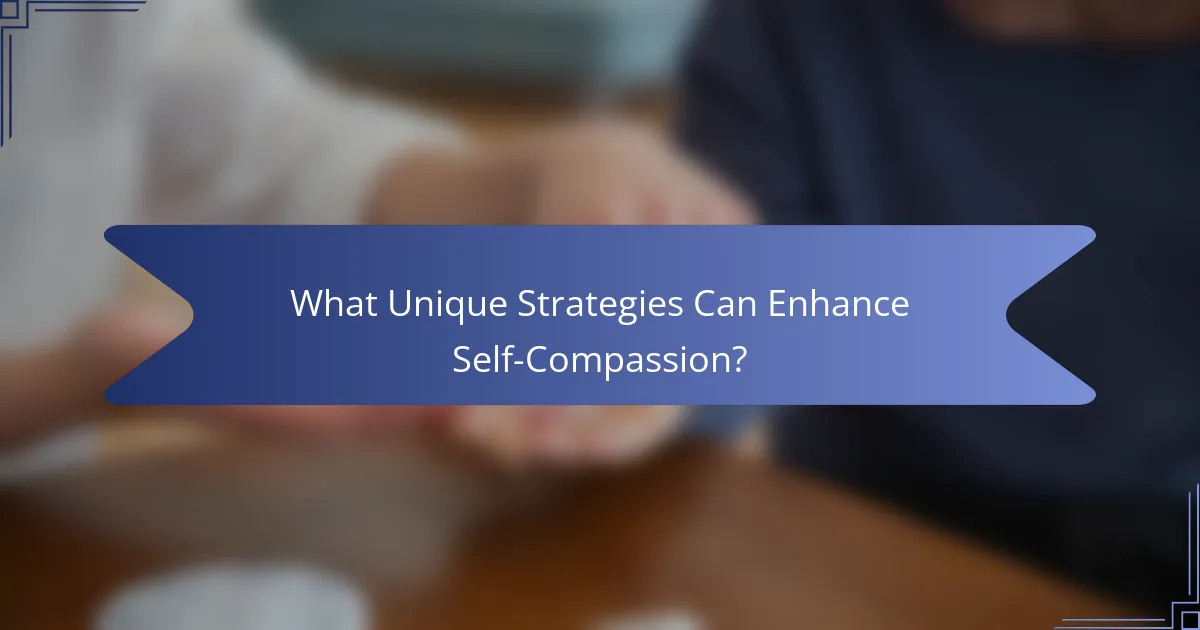
What Unique Strategies Can Enhance Self-Compassion?
Practicing self-compassion enhances resilience and reduces negative self-talk. Unique strategies include mindfulness techniques that foster awareness of thoughts, self-kindness practices that encourage positive self-dialogue, and common humanity reminders that emphasize shared experiences. Engaging in these strategies can significantly improve emotional well-being and promote a healthier self-image.
How Can Journaling Foster Self-Compassion?
Journaling can significantly foster self-compassion by allowing individuals to express thoughts and emotions freely. This practice helps to identify negative self-talk and reframe it positively. Writing promotes reflection, enabling a deeper understanding of personal experiences and emotions. As a result, individuals can cultivate resilience by recognizing patterns in their self-criticism and replacing them with kinder, more supportive narratives. Regular journaling can enhance emotional awareness, leading to improved self-acceptance and compassion.
What Techniques Can Help Reframe Negative Self-Talk?
Practicing self-compassion can effectively reframe negative self-talk. Techniques include mindfulness to observe thoughts without judgment, writing supportive letters to oneself, and using positive affirmations to counteract negativity. Engaging in self-soothing activities, such as meditation or deep breathing, enhances resilience. These strategies foster a kinder internal dialogue, promoting emotional well-being.
How Can Visualization Techniques Promote Self-Compassion?
Visualization techniques can significantly enhance self-compassion by fostering a positive mindset. These techniques help individuals reframe negative self-talk into supportive narratives. For instance, imagining a compassionate figure can provide emotional comfort during challenging times. Research indicates that visualization can activate brain regions associated with empathy, promoting resilience. Regular practice of these techniques cultivates a kinder inner dialogue, leading to improved mental well-being.
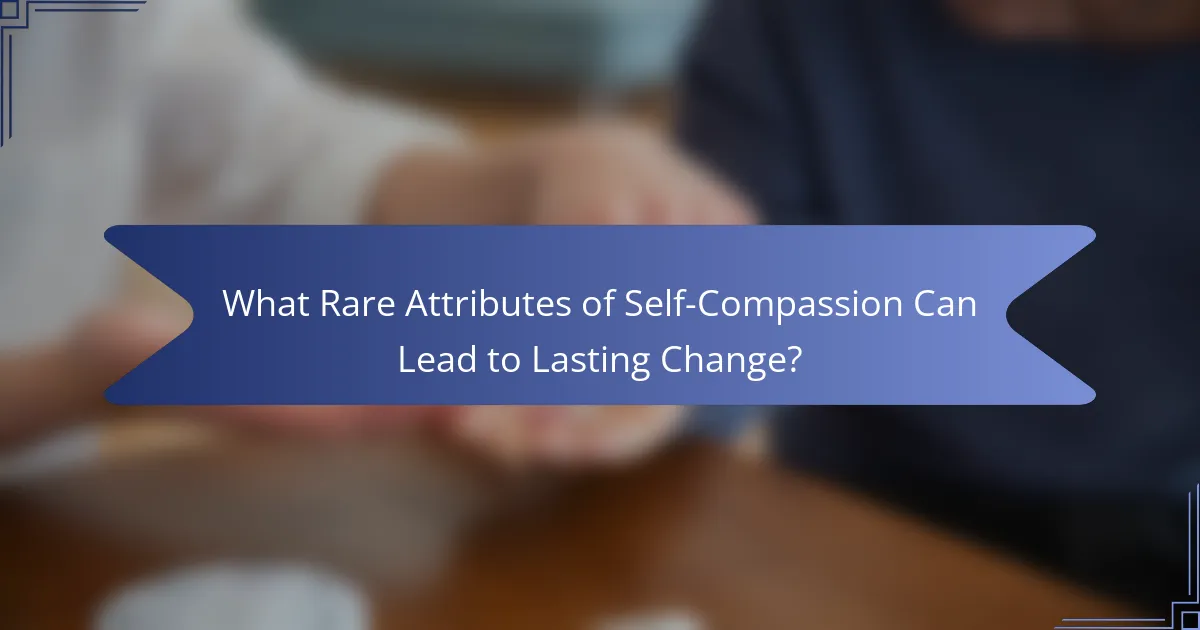
What Rare Attributes of Self-Compassion Can Lead to Lasting Change?
Rare attributes of self-compassion can significantly contribute to lasting change by fostering deeper emotional connections and promoting self-acceptance. One unique attribute is the ability to maintain a non-judgmental perspective during setbacks, which enhances resilience. Additionally, cultivating mindfulness as a rare trait allows individuals to observe their thoughts without attachment, reducing the impact of negative self-talk. These attributes create a foundation for sustained personal growth and emotional well-being.
How Does Self-Compassion Influence Relationships with Others?
Self-compassion enhances relationships by fostering empathy and understanding. When individuals practice self-compassion, they become more accepting of their imperfections, which translates to greater tolerance towards others. This mindset reduces negative self-talk, promoting resilience and emotional stability. As a result, individuals can engage more positively and constructively in their relationships, leading to deeper connections and improved communication.
What Unique Practices Can Individuals Adopt to Enhance Self-Compassion?
To enhance self-compassion, individuals can adopt practices such as mindfulness meditation, self-kindness exercises, and gratitude journaling. Mindfulness meditation encourages awareness of thoughts without judgment, helping to reduce negative self-talk. Self-kindness exercises involve treating oneself with the same care as one would for a friend, fostering a supportive internal dialogue. Gratitude journaling shifts focus from negative experiences to positive aspects of life, promoting resilience. These strategies collectively build a compassionate mindset, aiding in overcoming self-criticism and enhancing emotional well-being.
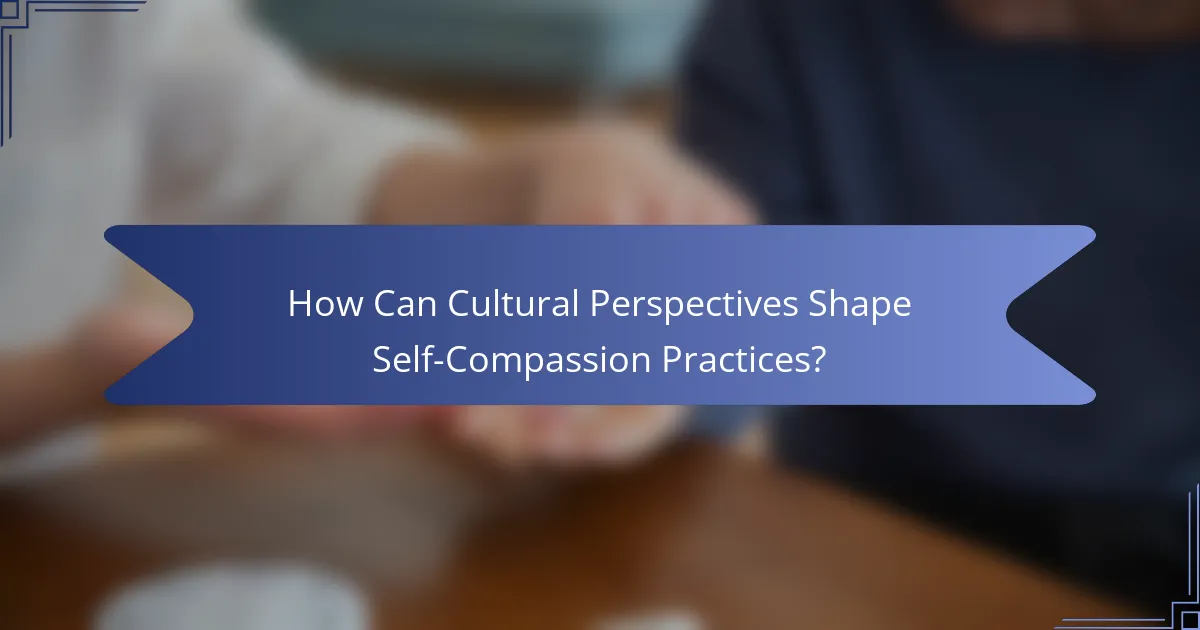
How Can Cultural Perspectives Shape Self-Compassion Practices?
Cultural perspectives significantly influence self-compassion practices by shaping beliefs and attitudes towards self-acceptance. Different cultures prioritize varying values, which can impact how individuals respond to negative self-talk. For instance, collectivist cultures may promote communal support, enhancing resilience through shared experiences. In contrast, individualistic cultures may focus on personal achievement, encouraging self-compassion as a tool for personal growth. Understanding these cultural nuances allows for tailored self-compassion strategies that resonate with individuals’ backgrounds, ultimately fostering greater emotional resilience.
What Cultural Barriers Exist to Practicing Self-Compassion?
Cultural barriers to practicing self-compassion include societal expectations, stigma around vulnerability, and misconceptions about self-care. These factors can create resistance to self-compassion practices. For example, cultures that prioritize stoicism may view self-compassion as weakness. Additionally, negative self-talk can be reinforced by cultural narratives that promote perfectionism. Overcoming these barriers requires awareness and intentional strategies to foster resilience and self-acceptance.
How Can Different Cultures Influence Self-Compassion Strategies?
Different cultures influence self-compassion strategies by shaping how individuals perceive and respond to negative self-talk. Cultural norms dictate emotional expression and resilience-building practices. For instance, collectivist cultures may emphasize community support, fostering self-compassion through shared experiences. In contrast, individualistic cultures might focus on personal achievements, encouraging self-affirmation techniques. These cultural differences create unique approaches to self-compassion, enhancing resilience in diverse ways. Understanding these cultural contexts can lead to more effective self-compassion strategies tailored to individual backgrounds.
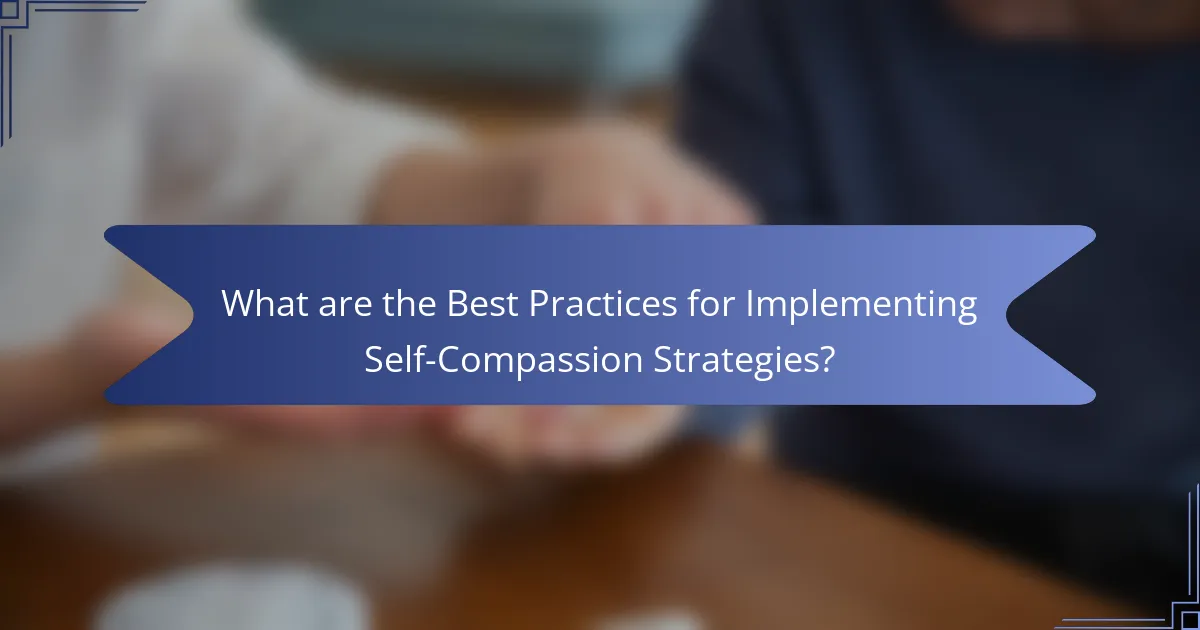
What are the Best Practices for Implementing Self-Compassion Strategies?
To effectively implement self-compassion strategies, focus on mindfulness, self-kindness, and common humanity. Mindfulness involves recognizing negative self-talk without judgment. Self-kindness encourages treating oneself with care during struggles. Embracing common humanity helps individuals understand that suffering is part of the shared human experience. Practicing these elements consistently can lead to greater resilience and reduced negative self-talk.
What Common Mistakes Should Be Avoided When Practicing Self-Compassion?
Practicing self-compassion involves avoiding common mistakes that can hinder progress. Key mistakes include self-criticism, unrealistic expectations, neglecting self-care, and misunderstanding self-compassion as self-indulgence. Recognizing these pitfalls fosters resilience and enhances positive self-talk.
How Can Individuals Track Their Progress in Building Resilience?
Individuals can track their progress in building resilience by regularly assessing their emotional responses and self-compassion practices. Journaling can help document feelings and thoughts, revealing patterns in negative self-talk. Setting specific goals related to self-compassion can provide measurable benchmarks. Engaging in mindfulness exercises allows for real-time reflection on emotional states. Seeking feedback from trusted peers can offer external perspectives on personal growth.
What Expert Insights Can Guide Effective Self-Compassion Practices?
Practicing self-compassion effectively involves specific strategies that counter negative self-talk and enhance resilience. Experts recommend mindfulness techniques, such as acknowledging and accepting feelings without judgment. Engaging in positive self-affirmations can also transform internal dialogue. Additionally, cultivating a supportive community fosters resilience through shared experiences. Regularly reflecting on personal strengths reinforces self-worth and combats negativity.